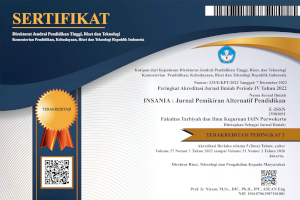TINJAUAN FILOSOFIS KURIKULUM 2013
DOI:
https://doi.org/10.24090/insania.v19i1.465Keywords:
philosophy, philosophical, curriculum, 2013Abstract
Tulisan ini menelaah aspek filosofis pada kurikulum 2013. Secara eksplisit kurikulum 2013 berdasarkan berbagai fondasi aliran filsafat dan aliran filsafat pendidikan. Kurikulum 2013 mencoba mengakomodasi dan menggabungkan halhal yang positif dari berbagai aliran filsafat dan aliran filsafat pendidikan. Namun bila ditinjau secara lebih mendalam, kurikulum 2013 lebih mementingkan tersampaikannya materi pelajaran meliputi pengetahuan, keterampilan, dan sikap yang ditentukan oleh para ahli secara sentralistis. Berdasarkan tinjauan mendalam tersebut, kurikulum 2013 lebih condong ke aliran filsafat idealisme, aliran filsafat pendidikan perrenialisme dan esensialisme. This paper examines the philosophical aspects of the 2013Curriculum. Explicitly, 2013 Curriculum is based on a variety of foundation in schools of philosophy and philosophical schools of education. 2013 Curriculum tries to accommodate and incorporate the positive things from various schools of philosophy and philosophical schools of education. Nevertheless, if we make a deeper view, the 2013 curriculum more concerned with the receipt of the curriculum subject by students include the knowledge, skills, and attitudes that are determined by experts in a centralized way. Based on the in-depth review, the curriculum in 2013 are more inclined to idealism philosophical schools, perrenialism and essentialism educational philosophy schools.Downloads
References
Kurikulum 2013 Kompetensi Dasar Sekolah Dasar (SD)/ Madrasah Ibtidaiyah (MI) Kementerian Pendidikan dan Kebudayaan/Kemendikbud, 2013a).
Kurikulum 2013 Kompetensi Dasar, Sekolah Menengah Atas (SMA)/ Madrasah Aliyah (MA), Kementerian Pendidikan dan Kebudayaan /Kemendikbud, 2013c).
Kurikulum 2013 Kompetensi Dasar, Sekolah Menengah Pertama (SMP)/ Madrasah Tsanawiyah (MTs, Kementerian Pendidikan dan Kebudayaan/ Kemendikbud, 2013b).
McNeil, John D. 1990. Curriculum A Comprehensive Introduction. London: Scott.
Ornstein, Allan C. and Francois P. Hunkins. TT.Curricullum, Foundations, Principles, and Issues. Boston: Pearson.
Salinan Lampiran Peraturan Menteri Pendidikan dan Kebudayaan (Permendikbud) Nomor 69 Tahun 2013 Tentang Kerangka Dasar dan Struktur Kurikulum Sekolah Menengah Atas/Madrasah Aliyah.
Schiro, Michael Stephen. 2013. Curriculum Theory Conflicting Visions and Enduring Concerns. Los Angeles: Sage Publication.
Downloads
How to Cite
Issue
Section
License
Authors who publish with this journal agree to the following terms:
Authors retain copyright and grant the journal right of first publication with the work simultaneously licensed under a Creative CommonsAttribution-ShareAlike License that allows others to share the work with an acknowledgment of the work's authorship and initial publication in this journal.
Authors are able to enter into separate, additional contractual arrangements for the non-exclusive distribution of the journal's published version of the work (e.g., post it to an institutional repository or publish it in a book), with an acknowledgment of its initial publication in this journal.
Authors are permitted and encouraged to post their work online (e.g., in institutional repositories or on their website) prior to and during the submission process, as it can lead to productive exchanges, as well as earlier and greater citation of published work (See The Effect of Open Access).








